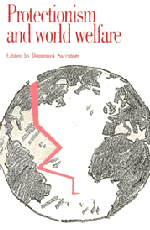Book contents
- Frontmatter
- Contents
- List of contributors
- Preface
- 1 Protectionism and world welfare: introduction
- I The new protectionism: an overview
- 2 Fair trade, reciprocity, and harmonization: the novel challenge to the theory and policy of free trade
- 3 The revival of protectionism in developed countries
- 4 Changes in the global trading system: a response to shifts in national economic power
- 5 “Fortress Europe” and retaliatory economic warfare
- II Trade theory, industrial policies, and protectionism
- III Exchange rates and protectionism
- IV The new protectionism in the world economy
- Author index
- Subject index
2 - Fair trade, reciprocity, and harmonization: the novel challenge to the theory and policy of free trade
Published online by Cambridge University Press: 18 September 2009
- Frontmatter
- Contents
- List of contributors
- Preface
- 1 Protectionism and world welfare: introduction
- I The new protectionism: an overview
- 2 Fair trade, reciprocity, and harmonization: the novel challenge to the theory and policy of free trade
- 3 The revival of protectionism in developed countries
- 4 Changes in the global trading system: a response to shifts in national economic power
- 5 “Fortress Europe” and retaliatory economic warfare
- II Trade theory, industrial policies, and protectionism
- III Exchange rates and protectionism
- IV The new protectionism in the world economy
- Author index
- Subject index
Summary
Writing in the new Journal of Economic Perspectives in 1987, my distinguished pupil and successor to my chair at MIT, Paul Krugman, declared:
the case for free trade is currently more in doubt than at any time since the 1817 publication of Ricardo's Principles of Political Economy… In the last ten years the traditional constant returns, perfect competition models of international trade have been supplemented and to some extent supplanted by a new breed of models that emphasizes increasing returns and imperfect competition. These new models… open the possibility that government intervention in trade via import restrictions, export subsidies, and so on may under some circumstances be in the national interest after all… free trade is not passé, but it is an idea that has irretrievably lost its innocence. Its status has shifted from optimum to reasonable rule of thumb. There is still a case for free trade as a good policy, and as a useful target in the world of politics, but it can never again be asserted as the policy that economic theory tells us is always right.
Trade theorists of my generation, who spearheaded the modern theory of commercial policy from the 1950s through the 1970s, exploring several types of market failures and the appropriate nature of governmental interventions (including the use of trade tariffs, quotas, and subsidies) in each such instance, have found it puzzling that anyone should seriously suggest that “economic theory” was believed until the 1980s to imply that free trade was “always right.”
- Type
- Chapter
- Information
- Protectionism and World Welfare , pp. 17 - 53Publisher: Cambridge University PressPrint publication year: 1993
- 6
- Cited by



